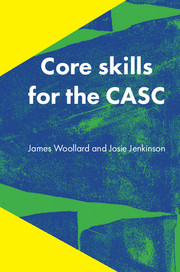Preface
Published online by Cambridge University Press: 01 January 2018
Summary
A shared view of our colleagues who have passed the Clinical Assessment of Skills and Competencies (CASC) exam – the final membership exam of the Royal College of Psychiatrists – is that our day-to-day clinical practice should have gone a long way in preparing us for it. We also felt that the preparation for the exam and the intense reflective learning we undertook as a part of that made us all better clinicians. The first and most important message of this book is that practice for the CASC should begin on day 1 of your training in psychiatry so that when you come to take the exam, although a significant hurdle, you are able to see it as an opportunity to display the subtle and refined skills you have developed over the years. In our experience, real life is far more challenging than the controlled environment of the CASC.
An ability to adapt the qualities of your voice, body language, questioning technique and structure under pressure is one of the keys to passing the CASC and will help you develop into an excellent clinician. We expect that you are already using this ability, perhaps unknowingly, as a part of your everyday communication. If you are not aware you are doing this, then recognition is the first step. Mastering this ability will take preparation, whether by reviewing videos of your performance or following verbal and written feedback after mock stations. Taking the approach of realistic, honest and open self-reflection with a preparedness to challenge yourself is an important part of your preparation. We hope that this book will act as a guide for this approach.
- Type
- Chapter
- Information
- Core Skills for the CASC , pp. vPublisher: Royal College of PsychiatristsPrint publication year: 2016



